- Home
- Alice Munro
Dear Life
Dear Life Read online
Dear Life
Alice Munro
In story after story in this brilliant new collection, Alice Munro pinpoints the moment a person is forever altered by a chance encounter, an action not taken, or a simple twist of fate. Her characters are flawed and fully human: a soldier returning from war and avoiding his fiancée, a wealthy woman deciding whether to confront a blackmailer, an adulterous mother and her neglected children, a guilt-ridden father, a young teacher jilted by her employer. Illumined by Munro’s unflinching insight, these lives draw us in with their quiet depth and surprise us with unexpected turns. And while most are set in her signature territory around Lake Huron, some strike even closer to home: an astonishing suite of four autobiographical tales offers an unprecedented glimpse into Munro’s own childhood. Exalted by her clarity of vision and her unparalleled gift for storytelling, Dear Life shows how strange, perilous, and extraordinary ordinary life can be.
Dear life
stories
by Alice Munro
Copyright
THIS IS A BORZOI BOOK
PUBLISHED BY ALFRED A. KNOPF
Copyright © 2012 by Alice Munro
All rights reserved. Published in the United States by Alfred A. Knopf, a division of Random House, Inc., New York. Originally published in Canada by McClelland & Stewart Ltd., a division of Random House of Canada Limited, Toronto.
www.aaknopf.com
Knopf, Borzoi Books, and the colophon are registered trademarks of Random House, Inc.
Most of the stories contained in this work were previously published in the following: “In Sight of the Lake” and “Night” in Granta; “Pride” and “Train” in Harper’s Magazine; “To Reach Japan” in Narrative Magazine; “Amundsen,” “Corrie,” “Dear Life,” “Gravel,” “Haven,” and “Leaving Maverly” in The New Yorker; and “Dolly” in Tin House.
Library of Congress Cataloging-in-Publication Data
Munro, Alice.
Dear life : stories / by Alice Munro.
p. cm.
“This is a Borzoi book.”
eISBN: 978-0-307-96104-4
I. Title.
PR9199.3.M8D43 2012 813′.54—dc23 2012020455
This is a work of fiction. Any resemblance to actual persons, living or dead, events, or locales is entirely coincidental.
Jacket image: View from the artist’s bedroom, c. 1930 by Percy Shakespeare (detail). Paul Liss Fine Art /
The Bridgeman Art Library.
Jacket design by Carol Devine Carson
v3.1
Dear life
stories
TO REACH JAPAN
ONCE Peter had brought her suitcase on board the train he seemed eager to get himself out of the way. But not to leave. He explained to her that he was just uneasy that the train should start to move. Out on the platform looking up at their window, he stood waving. Smiling, waving. The smile for Katy was wide open, sunny, without a doubt in the world, as if he believed that she would continue to be a marvel to him, and he to her, forever. The smile for his wife seemed hopeful and trusting, with some sort of determination about it. Something that could not easily be put into words and indeed might never be. If Greta had mentioned such a thing he would have said, Don’t be ridiculous. And she would have agreed with him, thinking that it was unnatural for people who saw each other daily, constantly, to have to go through explanations of any kind.
When Peter was a baby, his mother had carried him across some mountains whose name Greta kept forgetting, in order to get out of Soviet Czechoslovakia into Western Europe. There were other people of course. Peter’s father had intended to be with them but he had been sent to a sanatorium just before the date for the secret departure. He was to follow them when he could, but he died instead.
“I’ve read stories like that,” Greta said, when Peter first told her about this. She explained how in the stories the baby would start to cry and invariably had to be smothered or strangled so that the noise did not endanger the whole illegal party.
Peter said he had never heard such a story and would not say what his mother would have done in such circumstances.
What she did do was get to British Columbia where she improved her English and got a job teaching what was then called Business Practice to high school students. She brought up Peter on her own and sent him to college, and now he was an engineer. When she came to their apartment, and later to their house, she always sat in the front room, never coming into the kitchen unless Greta invited her. That was her way. She carried not noticing to an extreme. Not noticing, not intruding, not suggesting, though in every single household skill or art she left her daughter-in-law far behind.
Also, she got rid of the apartment where Peter had been brought up and moved into a smaller one with no bedroom, just room for a foldout couch. So Peter can’t go home to Mother? Greta teased her, but she seemed startled. Jokes pained her. Maybe it was a problem of language. But English was her usual language now and indeed the only language Peter knew. He had learned Business Practice—though not from his mother—when Greta was learning Paradise Lost. She avoided anything useful like the plague. It seemed he did the opposite.
With the glass between them, and Katy never allowing the waving to slow down, they indulged in looks of comic or indeed insane goodwill. She thought how nice-looking he was, and how he seemed to be so unaware of it. He wore a brush cut, in the style of the time—particularly if you were anything like an engineer—and his light-colored skin was never flushed like hers, never blotchy from the sun, but evenly tanned whatever the season.
His opinions were something like his complexion. When they went to see a movie, he never wanted to talk about it afterwards. He would say that it was good, or pretty good, or okay. He didn’t see the point in going further. He watched television, he read a book in somewhat the same way. He had patience with such things. The people who put them together were probably doing the best they could. Greta used to argue, rashly asking whether he would say the same thing about a bridge. The people who did it did their best but their best was not good enough so it fell down.
Instead of arguing, he just laughed.
It was not the same thing, he said.
No?
No.
Greta should have realized that this attitude—hands off, tolerant—was a blessing for her, because she was a poet, and there were things in her poems that were in no way cheerful or easy to explain.
(Peter’s mother and the people he worked with—those who knew about it—still said poetess. She had trained him not to. Otherwise, no training necessary. The relatives she had left behind in her life, and the people she knew now in her role as a housewife and mother, did not have to be trained because they knew nothing about this peculiarity.)
It would become hard to explain, later on in her life, just what was okay in that time and what was not. You might say, well, feminism was not. But then you would have to explain that feminism was not even a word people used. Then you would get all tied up saying that having any serious idea, let alone ambition, or maybe even reading a real book, could be seen as suspect, having something to do with your child’s getting pneumonia, and a political remark at an office party might have cost your husband his promotion. It would not have mattered which political party either. It was a woman’s shooting off her mouth that did it.
People would laugh and say, Oh surely you are joking and you would have to say, Well, but not that much. Then she would say, one thing, though, was that if you were writing poetry it was somewhat safer to be a woman than a man. That was where the word poetess came in handy, like a web of spun sugar. Peter would not have felt that way, she said, but remember he had been born in Europe. He would have understood, though, how the men he worked with were supposed to feel about s
uch things.
That summer Peter was going to spend a month or maybe longer in charge of a job that was being done at Lund, far up, in fact as far as you could go north, on the mainland. There was no accommodation for Katy and Greta.
But Greta had kept in touch with a girl she used to work with in the Vancouver library, who was married now and living in Toronto. She and her husband were going to spend a month in Europe that summer—he was a teacher—and she had written Greta wondering if Greta and her family would do them a favor—she was very polite—by occupying the house in Toronto for part of that time, not letting it stand empty. And Greta had written back telling her about Peter’s job but taking up the offer for Katy and herself.
That was why they were now waving and waving from the platform and from the train.
There was a magazine then, called The Echo Answers, published irregularly in Toronto. Greta had found it in the library and sent them some poems. Two of the poems had been published, and the result was that when the editor of the magazine came to Vancouver, last fall, she had been invited to a party, with other writers, to meet him. The party was at the house of a writer whose name had been familiar to her, it seemed, for her whole life. It was held in the late afternoon, when Peter was still at work, so she hired a sitter and set off on the North Vancouver bus across Lions Gate Bridge and through Stanley Park. Then she had to wait in front of the Hudson’s Bay for a long ride out to the university campus, which was where the writer lived. Let off at the bus’s last turning, she found the street and walked along peering at house numbers. She was wearing high heels which slowed her down considerably. Also her most sophisticated black dress, zipped up at the back and skimming the waist and always a little too tight at the hips. It made her look somewhat ridiculous, she thought, as she stumbled slightly, along the curving streets with no sidewalks, the only person about in the waning afternoon. Modern houses, picture windows, as in any up-and-coming suburb, not at all the kind of neighborhood she had expected. She was beginning to wonder if she had got the street wrong, and was not unhappy to think that. She could go back to the bus stop where there was a bench. She could slip off her shoes and settle down for the long solitary ride home.
But when she saw the cars parked, saw the number, it was too late to turn around. Noise seeped out around the closed door and she had to ring the bell twice.
She was greeted by a woman who seemed to have been expecting somebody else. Greeted was the wrong word—the woman opened the door and Greta said that this must be where they were having the party.
“What does it look like?” the woman said, and leaned on the doorframe. The way was barred till she—Greta—said, “May I come in?” and then there was a movement that seemed to cause considerable pain. She didn’t ask Greta to follow her but Greta did anyway.
Nobody spoke to her or noticed her but in a short time a teenage girl thrust out a tray on which there were glasses of what looked like pink lemonade. Greta took one, and drank it down at a thirsty gulp, then took another. She thanked the girl, and tried to start a conversation about the long hot walk, but the girl was not interested and turned away, doing her job.
Greta moved on. She kept smiling. Nobody looked at her with any recognition or pleasure and why should they? People’s eyes slid round her and then they went on with their conversations. They laughed. Everybody but Greta was equipped with friends, jokes, half-secrets, everybody appeared to have found somebody to welcome them. Except for the teenagers who kept sullenly relentlessly passing their pink drinks.
She didn’t give up, though. The drink was helping her and she resolved to have another as soon as the tray came around. She watched for a conversational group that seemed to have a hole in it, where she might insert herself. She seemed to have found one when she heard the names of movies mentioned. European movies, such as were beginning to be shown in Vancouver at that time. She heard the name of one that she and Peter had gone to see. The Four Hundred Blows. “Oh, I saw that.” She said this loudly and enthusiastically, and they all looked at her and one, a spokesperson evidently, said, “Really?”
Greta was drunk, of course. Pimm’s No. 1 and pink grapefruit juice downed in a hurry. She didn’t take this snub to heart as she might have done in a normal way. Just drifted on, knowing she had somehow lost her bearings but getting a feeling that there was a giddy atmosphere of permission in the room, and it didn’t matter about not making friends, she could just wander around and pass her own judgments.
There was a knot of people in an archway who were important. She saw among them the host, the writer whose name and face she had known for such a long time. His conversation was loud and hectic and there seemed to be danger around him and a couple of other men, as if they would as soon fire off an insult as look at you. Their wives, she came to believe, made up the circle she had tried to crash into.
The woman who had answered the door was not one of either group, being a writer herself. Greta saw her turn when her name was called. It was the name of a contributor to the magazine in which she herself had been published. On these grounds, might it not be possible to go up and introduce herself? An equal, in spite of the coolness at the door?
But now the woman had her head lolling on the shoulder of the man who had called her name, and they would not welcome an interruption.
This reflection made Greta sit down, and since there were no chairs she sat on the floor. She had a thought. She thought that when she went with Peter to an engineers’ party, the atmosphere was pleasant though the talk was boring. That was because everybody had their importance fixed and settled at least for the time being. Here nobody was safe. Judgment might be passed behind backs, even on the known and published. An air of cleverness or nerves obtained, no matter who you were.
And here she had been desperate for anybody to throw her any old bone of conversation at all.
When she got her theory of the unpleasantness worked out she felt relieved and didn’t much care if anybody talked to her or not. She took her shoes off and the relief was immense. She sat with her back against a wall and her legs stuck out on one of the lesser of the party’s thoroughfares. She didn’t want to risk spilling her drink on the rug so she finished it in a hurry.
A man stood over her. He said, “How did you get here?”
She pitied his dull clumping feet. She pitied anybody who had to stand up.
She said that she had been invited.
“Yes. But did you come in your car?”
“I walked.” But that was not enough, and in a while she managed to offer up the rest of it.
“I came on a bus, then I walked.”
One of the men who had been in the special circle was now behind the man in the shoes. He said, “Excellent idea.” He actually seemed ready to talk to her.
The first man didn’t care for this one so much. He had retrieved Greta’s shoes, but she refused them, explaining that they hurt too much.
“Carry them. Or I will. Can you get up?”
She looked for the more important man to help her, but he wasn’t there. Now she remembered what he’d written. A play about Doukhobors that had caused a big row because the Doukhobors were going to have to be naked. Of course they weren’t real Doukhobors, they were actors. And they were not allowed to be naked after all.
She tried explaining this to the man who helped her up, but he was plainly not interested. She asked what he wrote. He said he was not that kind of writer, he was a journalist. Visiting in this house with his son and daughter, grandchildren of the hosts. They—the children—had been passing out the drinks.
“Lethal,” he said, referring to the drinks. “Criminal.”
Now they were outside. She walked in her stocking feet across the grass, barely avoiding a puddle.
“Somebody has thrown up there,” she told her escort.
“Indeed,” he said, and settled her into a car. The outside air had altered her mood, from an unsettled elation to something within reach of embarrassment, even sh
ame.
“North Vancouver,” he said. She must have told him that. “Okay? We’ll proceed. The Lions Gate.”
She hoped he wouldn’t ask what she was doing at the party. If she had to say she was a poet, her present situation, her overindulgence, would be taken as drearily typical. It wasn’t dark out, but it was evening. They seemed to be headed in the right direction, along some water then over a bridge. The Burrard Street bridge. Then more traffic, she kept opening her eyes to trees passing by, then shutting them again without meaning to. She knew when the car stopped that it was too soon for them to be home. That is, at her home.
Those great leafy trees above them. You could not see any stars. But some shine on the water, between wherever they were and the city lights.
“Just sit and consider,” he said.
She was enraptured by the word.
“Consider.”
“How you’re going to walk into the house, for instance. Can you manage dignified? Don’t overdo it. Nonchalant? I presume you have a husband.”
“I will have to thank you first for driving me home,” she said. “So you will have to tell me your name.”
He said that he had already told her that. Possibly twice. But once again, okay. Harris Bennett. Bennett. He was the son-in-law of the people who had given the party. Those were his children, passing out the drinks. He and they were visiting from Toronto. Was she satisfied?
“Do they have a mother?”
“Indeed they do. But she is in a hospital.”
“I’m sorry.”
“No need. It’s quite a nice hospital. It’s for mental problems. Or you might say emotional problems.”
She hurried on to tell him that her husband was named Peter and that he was an engineer and that they had a daughter named Katy.

 Runaway
Runaway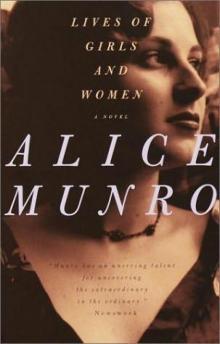 Lives of Girls and Women
Lives of Girls and Women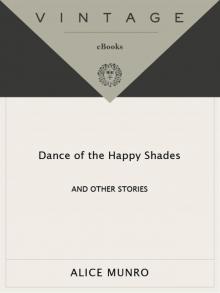 Dance of the Happy Shades
Dance of the Happy Shades Open Secrets
Open Secrets Julieta (Movie Tie-in Edition)
Julieta (Movie Tie-in Edition)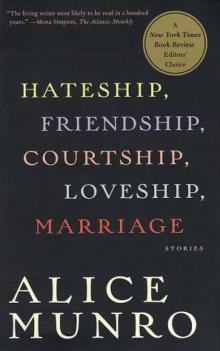 Hateship, Friendship, Courtship, Loveship, Marriage: Stories
Hateship, Friendship, Courtship, Loveship, Marriage: Stories Alice Munro's Best
Alice Munro's Best The Progress of Love
The Progress of Love Selected Stories
Selected Stories Away from Her
Away from Her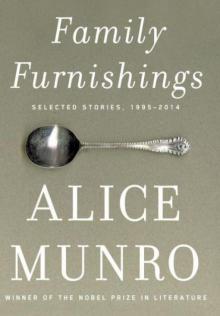 Family Furnishings
Family Furnishings Moons of Jupiter
Moons of Jupiter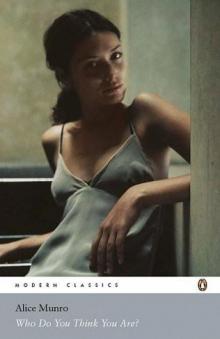 Who Do You Think You Are?
Who Do You Think You Are? Hateship, Friendship, Courtship, Loveship, Marriage
Hateship, Friendship, Courtship, Loveship, Marriage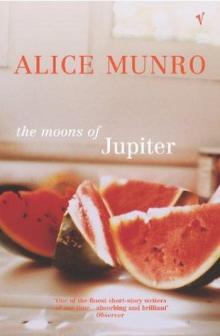 The Moons of Jupiter
The Moons of Jupiter Vintage Munro
Vintage Munro The Love of a Good Woman
The Love of a Good Woman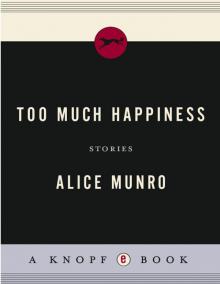 Too Much Happiness
Too Much Happiness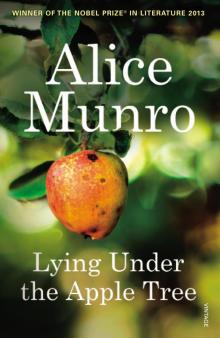 Lying Under the Apple Tree
Lying Under the Apple Tree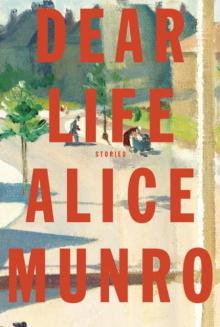 Dear Life
Dear Life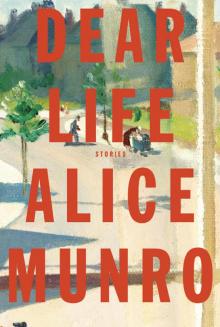 Dear Life: Stories
Dear Life: Stories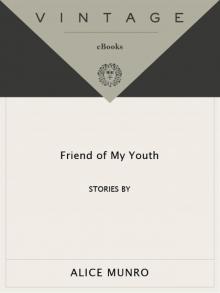 Friend of My Youth
Friend of My Youth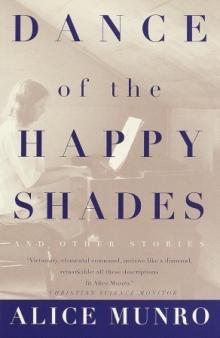 Dance of the Happy Shades: And Other Stories
Dance of the Happy Shades: And Other Stories The Beggar Maid
The Beggar Maid